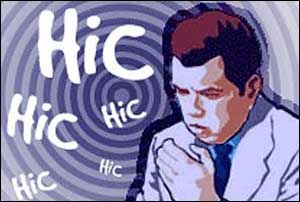- Home
- Editorial
- News
- Practice Guidelines
- Anesthesiology Guidelines
- Cancer Guidelines
- Cardiac Sciences Guidelines
- Critical Care Guidelines
- Dentistry Guidelines
- Dermatology Guidelines
- Diabetes and Endo Guidelines
- Diagnostics Guidelines
- ENT Guidelines
- Featured Practice Guidelines
- Gastroenterology Guidelines
- Geriatrics Guidelines
- Medicine Guidelines
- Nephrology Guidelines
- Neurosciences Guidelines
- Obs and Gynae Guidelines
- Ophthalmology Guidelines
- Orthopaedics Guidelines
- Paediatrics Guidelines
- Psychiatry Guidelines
- Pulmonology Guidelines
- Radiology Guidelines
- Surgery Guidelines
- Urology Guidelines
Treating Intractable hiccups may be a challenging job

Some people suffer intractable hiccups that may last longer than a month, according to a study published in journal Current Neurology and Neuroscience Reports. Ninety-one percent of people who suffer intractable hiccups are men generally above 50 years of age. Common triggers are drinking carbonated drinks or eating a large meal. It can also be caused by anxiety or stress along with alcohol, spices, smoking or other irritants to the gastrointestinal or respiratory tracts.
Hiccup treatments cover multiple disciplines, including neurology, gastroenterology, pulmonology and primary care, Drs. Rouse and Wodziak wrote. There are no formal guidelines for treating intractable hiccups. Many treatments are founded merely on a physician's own experience or anecdotal evidence.
"There is a lack of good quality evidence to recommend specific treatment for hiccups," Drs. Rouse and Wodziak wrote.
Its production is a complex mechanism which involves multiple neurotransmitters and anatomical structure within the central and peripheral nervous system.
"Intractable hiccups can occur more often than we realize and present to multiple medical disciplines," said Stasia Rouse, MD, and Matthew Wodziak, MD. Hiccups typically occur between four and 60 times a minute. Acute hiccups are common. They start without any specific reason and go away in a few minutes. They often can be stopped by holding the breath or breathing into a paper bag.
Persistent hiccups (lasting longer than two days) and intractable hiccups (lasting longer than a month) generally are linked to underlying medical conditions. They interfere with eating, socializing and sleeping and can significantly impair a patient's quality of life. According to the Guinness Book of World Records, the longest recorded case was of an Iowa farmer who hiccupped continually for 69 years and nine months.
Dr. Rouse and Dr.Wodziak describe a hiccup as an involuntary, spasmodic contraction of the diaphragm and sometimes the intercostal muscles (tiny muscles between the ribs). This causes inhalation to be cut short by the closure of the glottis (the opening between the vocal chords).
Intractable hiccups may be due to various medical causes. In one patient, hiccups were traced to arthritis in the sternoclavicular joint (the joint connecting the collarbone to the breastbone). In another patient, it was linked to pulmonary embolisms (blood clots in the lungs). It can also be triggered by certain drugs.
In addition to treating the underlying cause, if known, physicians can treat hiccups with various medications, including baclofen, gabapentin, metoclopramide, chlorpromazine and haloperidol, Drs. Rouse and Wodziak wrote. Nerve blocks within or near the phrenic nerve (involved in breathing) also are being studied. Other reported remedies include swallowing granulated sugar, hypnosis, and acupuncture.
For reference log on to https://link.springer.com/article/10.1007/s11910-018-0856-0

Disclaimer: This site is primarily intended for healthcare professionals. Any content/information on this website does not replace the advice of medical and/or health professionals and should not be construed as medical/diagnostic advice/endorsement or prescription. Use of this site is subject to our terms of use, privacy policy, advertisement policy. © 2020 Minerva Medical Treatment Pvt Ltd